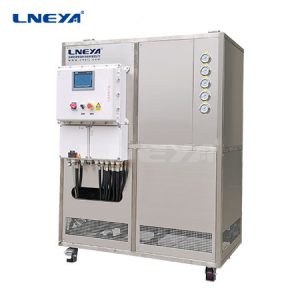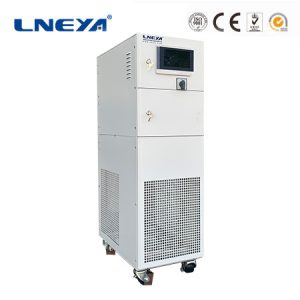
Laboratory crystallization temperature control cooling and heating system
In the laboratory crystallization process, temperature controlled cooling and heating system is a crucial component used to precisely control the temperature of the crystallization solution, in order to achieve high purity, specific morphology, and ideal size crystal growth of the target product.
The following are the core characteristics and applications of the laboratory crystallization temperature control cooling and heating system:
Accurate temperature control: During the crystallization process, temperature has a significant impact on the crystallization rate, crystal morphology, and purity. The temperature control system should have high-precision temperature control capabilities, usually requiring a temperature control accuracy of ± 0.1 ℃ or even higher, to ensure the stability of crystallization conditions and the repeatability of experimental results.
Wide temperature range: Crystallization experiments may need to be conducted over a wide temperature range, from near room temperature to low temperature (such as – Ⅰ 96 ℃ liquid nitrogen temperature) or high temperature (such as high temperature and high pressure environment in hydrothermal methods). The temperature control system should have a sufficiently wide temperature adjustment range to adapt to the crystallization conditions of different compounds.
Integrated cooling and heating functions: A high-quality laboratory crystallization temperature control system should have both cooling and heating functions. Cooling is usually achieved through methods such as compressor cooling, semiconductor cooling, or liquid nitrogen cooling; Heating is carried out through electric heating elements, hot water baths or hot oil baths, etc. This allows for flexible switching of cooling or heating modes according to experimental needs, achieving full temperature control.
Temperature programming function: Some crystallization experiments need to be carried out according to specific temperature change curves, such as gradient cooling, constant temperature maintenance, step heating, etc. The temperature control system should support temperature programming function, allowing users to set and store complex temperature control programs, and automatically operate according to the preset temperature trajectory.
Stability and uniformity: The temperature control system should ensure the stability and uniformity of temperature throughout the entire crystallization process, avoiding uneven or poor crystal growth caused by local overheating or undercooling. This usually requires good thermal conductivity design, efficient mixing systems, and precise temperature sensors and control systems.
Compatible with different types of crystallization equipment: The crystallization temperature control system should be able to seamlessly interface with various commonly used crystallization equipment in laboratories (such as crystallization kettles, microwave crystallizers, constant temperature tanks, cold traps, etc.), and provide temperature control through dedicated interfaces or adapters.
Safety protection and alarm system: The temperature control system should have safety measures such as over temperature protection, over current protection, and power outage protection to prevent equipment damage or experimental safety accidents. At the same time, it is equipped with a temperature over limit alarm function to promptly remind operators when the temperature deviates from the set value.
User friendly interface and data recording: With an intuitive and easy-to-use operating interface, it is easy to set and monitor temperature parameters. Support data recording and export functions, facilitating the analysis and traceability of experimental results.
The laboratory crystallization temperature controlled cooling and heating system is widely used in fields such as drug crystallization, materials science, chemical synthesis, biotechnology, etc. It plays a key role in optimizing crystallization processes, improving product purity and crystallization efficiency, and studying crystallization kinetics.
- More
SUNDI Z Frequency Conversion Series
WHATSAPP WECHAT Ultra high temperature cooling technology can directly cool from a high temperature of 300℃[because only the heat transfer medium in the expansion…
- More
SUNDI -10℃~150℃
Fully enclosed system, single medium completes refrigeration and heating -120~350℃ ±0.5℃ AC 380V 50HZ 8kW max Ultra high temperature cooling technology can directly cool from a hi…
- More
SUNDI -80℃~250℃
● Working temperatures from -120°C to +350°C ● Previously unachievable performance ●Intelligent temperature control ● Maximum process stability and reproducibility ● Adop plate heat exchager, Pipeline heating, the fastest he…
- More
SUNDI-320/320W
Fully enclosed system, single medium completes refrigeration and heating -120~350℃ ±0.5℃ Ultra-high Temperature Cooling Technology Can Directly Cool Down From 300℃ High Temperature. Bec…
- More
SUNDI -25℃~200℃
Fully enclosed system, single medium completes refrigeration and heating -120~350℃ ±0.5℃ ● Working temperatures from -120°C to +350°C ● Previously unachievable performance ●Intelligent temperature control…
- More
SUNDI -25℃~300℃
● Working temperatures from -120°C to +350°C● Previously unachievable performance●Intelligent temperature control● Maximum process stability and reproducibility● Adop plate heat exchager, Pipeline heating, the fastest heating a…
- More
SUNDI -45℃~250℃
● Working temperatures from -120°C to +350°C ● Previously unachievable performance ●Intelligent temperature control ● Maximum process stability and reproducibility ● Adop plate heat exchager, Pipeline heating, the fastest heat…
- More
SUNDI -60℃~250℃
Ultra high temperature cooling technology can directly cool from a high temperature of 300℃[because only the heat transfer medium in the expansion chamber contacts with ox…
loading…
已经是到最后一篇内容了!
Related recommendations
-
ZLF Series
3403Special temperature control system for reaction kettle -120~250℃ 士1°C TCU temperature control system USES the existing heat (such as steam, cooling water and cryogenic liquid - the "primary") system infr...
View details -
SUNDI-320/320W
3454Fully enclosed system, single medium completes refrigeration and heating -120~350℃ ±0.5℃ Ultra-high Temperature Cooling Technology Can Directly Cool Down From 300℃ High Temperature. Bec...
View details -
What type of temperature control system is required for smear preparation in the pharmaceutical industry?
1404In the pharmaceutical industry, negative pressure drying and smear preparation have specific requirements for temperature control, and usually require precise and adjustable temperature control devices to ensure product quality and process sta...
View details -
Application Of Jacketed Reactor Cooling And Heating System In Chemical Reactions
1511In the chemical industry, jacketed reactor cooling and heating devices are widely used in various chemical reactions. Application of jacketed reactor cooling and heating devices in various chemical reactions: Polymerization is a c...
View details
 LNEYA Industrial Chillers Manufacturer Supplier
LNEYA Industrial Chillers Manufacturer Supplier




















